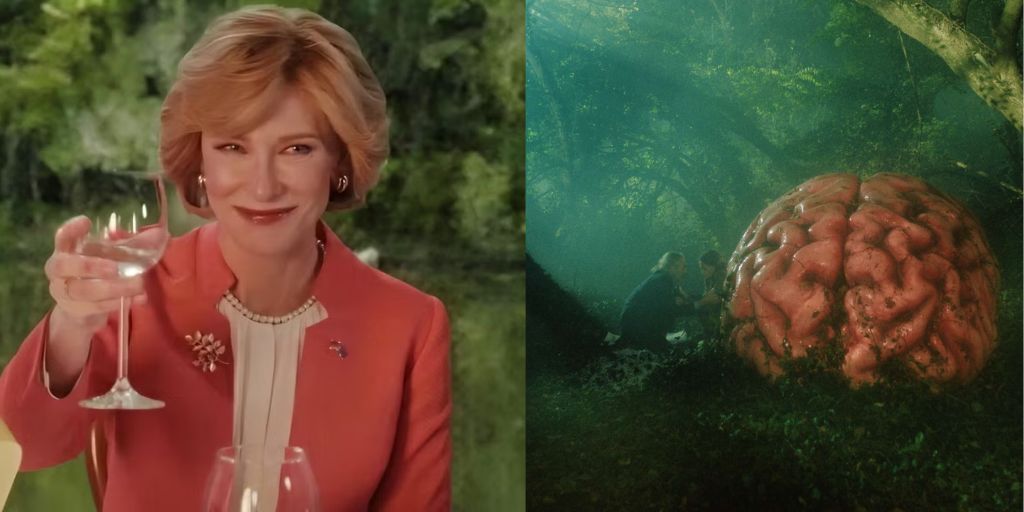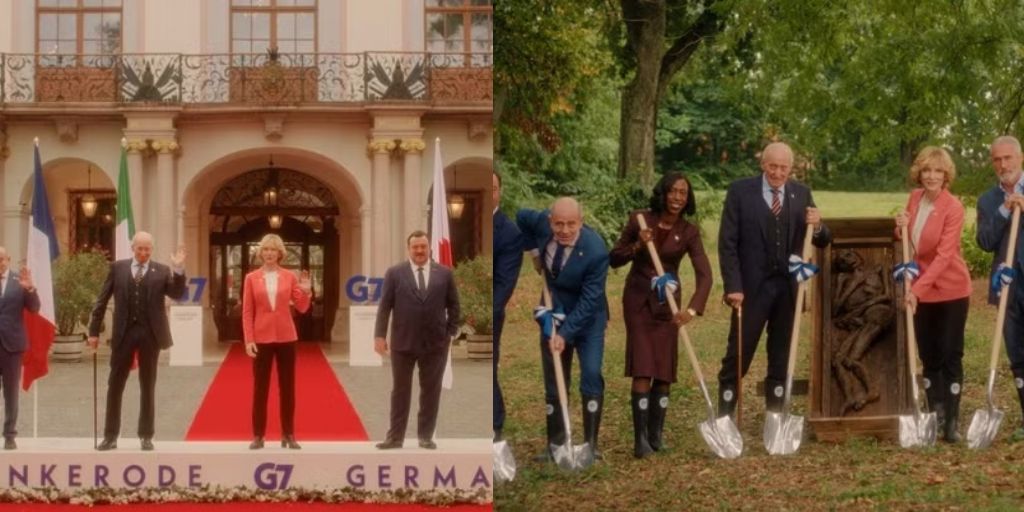In the movie Rumours, a unique story unfolds as seven world leaders find themselves acting like teenagers caught in a soap opera during a zombie apocalypse.
Charles Dance plays the U.S. President with a classic English accent. This film, created by Evan Johnson, Galen Johnson, and Guy Maddin, is nothing short of strange.
It is a blend of dark comedy, melodrama, and gothic horror themes, reminiscent of classic zombie films by George Romero. Throughout its runtime, the film delivers unexpected surprises, some of which land effectively while others fall flat.
The narrative takes a satirical aim at the foolishness and incompetence of elected officials, suggesting that they are no better at handling crises than the average person. As the story progresses, it veers too far into the bizarre, losing its direction by the climax.
However, the journey is filled with entertaining moments, making it worthwhile. The film’s greatest strength lies in its talented cast. Rumours may not appeal to everyone, but for those who enjoy a hefty serving of strangeness alongside biting political satire, there is much to enjoy.
What Is Rumours About?
The story begins with the G7 leaders meeting in Germany to address a mysterious ongoing crisis, which the film never explicitly defines.
The group consists of the Chancellor of Germany, Helga (played by Cate Blanchett), the President of the United States, Edison (played by Charles Dance), the Prime Minister of the United Kingdom, Cardosa (played by Nikki Amuka-Bird).
The Prime Minister of Canada, Maxime (played by Roy Dupuis), the President of France, Sylvain (played by Denis Ménochet), the Prime Minister of Italy, Antonio (played by Rolando Ravello), and the Prime Minister of Japan, Tatsuro (played by Takehiro Hira).
The film opens with Helga welcoming the leaders by revealing a two-thousand-year-old mummified body.
The scene is both humorous and macabre, as the leaders pose for pictures beside the corpse, which is a man with his severed penis wrapped around his neck. This darkly comedic moment sets the tone for the absurdity that will follow.
The leaders gather at a remote estate for a private dinner to discuss their provisional statement. This setting allows the dynamics between the leaders to develop. Maxime emerges as the “bad boy” of the group, a notorious flirt with a history of romantic entanglements with Cardosa.
Despite his charm, Helga also tries to flirt with him, creating a humorous love triangle. Cardosa, on the other hand, appears to be the most serious and professional among them. Meanwhile, President Edison seems more concerned with maintaining his British accent than addressing the crisis at hand.
As the evening progresses, the leaders find themselves cut off from the outside world—there is no phone service, and the waiters have mysteriously vanished. When Sylvain steps outside to retrieve some papers, he discovers that they have been completely abandoned. Suddenly, the group is attacked by “shady figures.”
The film humorously suggests a few possibilities: Have the mummies come back to reclaim their territory? Is it an alien invasion? These questions only add to the chaos as the leaders must unite to escape the estate and uncover what is happening, but not before Helga and Maxime sneak off for a quickie.
Rumours Is Camp Dark Comedy
Rumours shines when it focuses on its main characters acting like reckless fools. The film leans heavily into camp comedy, often feeling like an episode of an early 2000s teen drama.
Maxime, with his trendy hairstyle and laid-back attitude, becomes emotional as he recalls his numerous romantic conquests, while a lustful Helga is determined to become his next fling. The movie’s absurdity serves to bring powerful figures down to earth, showing them as silly and misguided.
A melodramatic score punctuates the film, amplifying its comedic elements. For example, when Maxime reminisces about a night spent with Cardosa, a sultry jazz tune enhances the scene’s romantic tension.
Conversely, when Sylvain expresses his fears about the unfolding horrors, a dizzying close-up of his face captures the frantic mood, reminiscent of classic 1960s British horror films.
As the leaders wander through the woods, enveloped by thick fog, the visuals evoke a nostalgic feel, reminiscent of old Scooby-Doo episodes or classic adaptations like The Hound of the Baskervilles. There is also a clear influence from Romero’s films, which adds to the eerie atmosphere.
While Rumours is not a traditional horror movie, it effectively conjures a sense of dread similar to the genre’s finest works. The directors’ unique style complements the wild script, which shifts between comedy, melodrama, satire, and horror at a moment’s notice.
The first half of the film thrives on the absurdity of the situation and the pure entertainment value of watching these world leaders behave foolishly.
However, things take an even stranger turn when a giant human brain appears, and a confused Alicia Vikander, portraying the secretary-general of the European Commission, warns of impending doom, yet no one can understand her message.
What starts as a well-executed and fun concept gradually loses its way as the plot becomes unfocused. The pacing falters, and the metaphor of bad leadership is overshadowed by the ridiculousness of “masturbating mummies.”
The silliness can overwhelm the viewer, making it challenging to appreciate the satire, even though the initial enjoyment of the film is undeniable.
Cate Blanchett Leads an Excellent Cast in Rumours
Despite the aimless plot, the cast of Rumours is what makes it worth watching. Cate Blanchett delivers an unforgettable performance as Helga, the German chancellor. She portrays a character who is both desperate and humorous, someone who lets her desires take over her decision-making.
Blanchett is known for her powerful dramatic roles, but in Rumours, she proves that she can also shine in comedic roles, creating a character that is hilariously relatable in her quest for affection.
Roy Dupuis also stands out as Maxime, making his character a swoon-worthy yet brooding figure. His portrayal is layered, showing a prime minister who writes poetic notes about life while struggling to fulfill his political duties. His character adds depth to the story, providing a contrast to the more outrageous behaviors of the other leaders.
Denis Ménochet, as Sylvain, plays the French President like a caricature of a classic detective, complete with exaggerated mannerisms. He delivers monologues about democracy while displaying a clear disdain for his Canadian counterpart, showcasing the film’s satirical edge. His performance is a highlight, as he embraces the campy elements without reservation.
The rest of the cast also fulfills their roles convincingly, with Nikki Amuka-Bird’s Cardosa serving as a level-headed British Prime Minister amidst the chaos. Her character adds a touch of reason and rationality, making her interactions with the other leaders even more entertaining.
While Charles Dance’s choice to don a British accent as the U.S. President raises questions, it does contribute to the film’s absurdity. The humor of the situation is enhanced by the exaggerated accents and performances of the actors, further immersing viewers in the Rumours world.
Themes of Absurdity and Political Commentary
Rumours uses its bizarre premise to show themes of absurdity and incompetence in leadership. The film cleverly mocks the political elite by showcasing their inability to deal with crisis situations.
As the G7 leaders face the threat of zombies, their reactions and interactions highlight their foolishness. The humor lies in how they approach problems, often prioritizing personal desires over the responsibilities of their positions.
The absurdity of the situations serves as a mirror to real-life political events, where leaders often seem disconnected from the issues affecting ordinary people.
By placing these powerful figures in ridiculous scenarios, the film emphasizes the gap between their actions and the needs of their citizens. The satire serves as a critique of political incompetence and the failure of those in power to address crises effectively.
In a world where real-life political leaders sometimes behave like characters from a soap opera, Rumours shines a light on the foolishness that can occur at the highest levels of government. The film suggests that, in times of crisis, these leaders are often just as lost and confused as anyone else. This message resonates with viewers, making the film both entertaining and thought-provoking.
A Mixed Bag of Humor and Horror
The blend of humor and horror is central to Rumours. While it starts strong with its comedic elements, the film eventually struggles to maintain that balance. The sudden shift from lighthearted camp to bizarre horror can leave viewers feeling disoriented. While the film manages to capture some of the tension and fear associated with classic horror films, it does so at the expense of the comedic narrative.
The moments of absurdity, such as the appearance of the giant brain and the mysterious warnings from Alicia Vikander’s character, disrupt the flow of the story.
These bizarre twists can alienate viewers who may have been enjoying the initial setup and humor. As the plot becomes more chaotic, the humor often feels overshadowed, leading to a lack of cohesion in the narrative.
Despite these flaws, Rumours still manages to entertain with its outrageous moments and humorous character interactions.
The film invites viewers to suspend their disbelief and embrace the strangeness. The enjoyment lies in the absurdity of the situation and the performances of the cast, who fully commit to their roles.
Conclusion: Embracing the Strange in Rumours
Ultimately, Rumours is a film that dares to be different. It embraces its strangeness and offers a unique take on political satire. While the plot may become disjointed and the pacing uneven, the film’s strengths lie in its performances and its willingness to push boundaries.

The talented cast, led by Cate Blanchett, brings life to the absurdity of the story. Their comedic timing and commitment to their characters enhance the film’s full enjoyment.
Even though Rumours may leave viewers with a sense of confusion, it also prompts reflection on the nature of political leadership and the absurdity of those in power.
For those willing to take a journey into the bizarre, Rumours provides a wild ride filled with laughter, chaos, and thought-provoking commentary. It’s a film that challenges expectations and leaves audiences with the question: “What the hell just happened?”
Rumours is an offbeat comedy that combines the elements of political satire, melodrama, and horror. It showcases world leaders in absurd situations, highlighting their incompetence and foolishness.
While it may not satisfy everyone, its unique perspective on politics and its entertaining performances make it a noteworthy watch for fans of dark comedies and satire.




